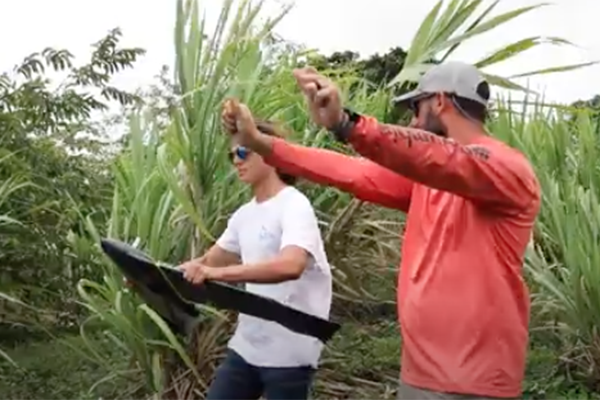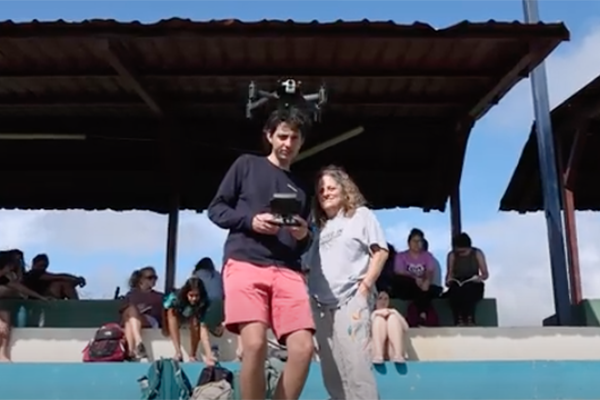Using drones to study the Galápagos Islands, Cohen adds to summer study abroad experience
December 2, 2022
The Galápagos Islands’ unique landscape and topography provide the backdrop for a five-week program with the UNC Study Abroad Office and a partnership between UNC-Chapel Hill’s Center for Galápagos Studies and Universidad San Francisco de Quito (USFQ) in Ecuador.
Over the summer, UNC Institute for the Environment Associate Director Susan Cohen joined other UNC and USFQ faculty to teach a lab on drones and sensors to study hydrology. Students in the program enrolled in two courses and a lab. The courses combine both classroom and field experiences, such as tours of wastewater treatment plants, community service projects, beach cleanups, and hikes on organic farms. Each course focuses on broad concepts with applications specific to the tropics and Galapagos. Students are further immersed in the culture by staying with families through homestays.
“This type of experiential education is really unique,” said Cohen. “You’re learning stuff every day about how to go somewhere and get along with other people. You understand other people’s lives and the struggles that they have both environmentally and socially.”
The geographical characteristics of the Galapagos make it an interesting place to study hydrology, according to Cohen. The islands have limited sources of fresh water and a thriving tourist industry that relies on a constant source of water. Climate change is impacting rainfall patterns and saltwater intrusion which poses a risk to freshwater accessibility.
San Cristobal Island, where the group spends most of its time, only has one source of fresh water, a crater lake called El Junco. The island otherwise relies on desalinization. The lake is completely rain-driven, which allows students to study how the water moves through the landscape, including factors that create fluctuations in the hydrology cycle, such as floods, droughts and climate change.
Development and sustainability are also important topics to study in the Galapagos as the tourist industry accelerates development. Students explore the challenges of adequate access to clean water through the lens of the Galapagos.
Since there is limited high-resolution remote sensing information available for the Galapagos, drones were used to address this problem and study the landscape.
However, flying drones proved to be a challenge.
“There’s changing weather patterns and a lot of mist and clouds in the air so it can be challenging from a weather perspective,” said Cohen.
Another difficulty was a lack of open space to teach students how to fly drones.
Despite the challenges, students were able to practice by using drones to map the landscape on an organic farm. The map, which analyzed habitats and landscapes, was presented to the farmer.
Cohen shared plans to use the drones again in Ecuador in future years.
“We probably will do it a little bit differently now that we have a little bit more experience flying there,” she said.
Cohen, who has been a part of this program for two years, has always fostered a love for travel. Although this is one of the few times, she has been able to work internationally.
“To be able to combine my love of adventure with actual work and teaching is incredible,” Cohen explained.
The program will look a little different next year, incorporating various ecosystems in Ecuador in addition to the Galapagos.
“It’s going to be great. We can’t wait,” she said.
The new five-week program will focus on hydrology and remote sensing specifically. The first two weeks, which will lay the foundation of the course, will be asynchronous. During the remaining three weeks, students will travel to Ecuador and visit the Amazon rainforest, the capital city of Quito, the cloud forest in Mindo, and Isabela Island in the Galapagos.
While the program will be more intensive and require a lot of trekking, the one thing that won’t change is the strong sense of community.
“We’re doing really interesting things in an amazing place and we’re all kind of learning together,” Cohen said.
The group aspect of the program encourages students to form connections with both their peers and professors.
“We always like to have fun when we’re also learning in Galapagos. There’s always time to just get out there, have fun, and enjoy the environment because it really is a special place with regard to flora and fauna and biodiversity. It’s like no other place in the world,” said Cohen.
Story by Natalie Peoples
Natalie Peoples is a student at UNC-Chapel Hill. Natalie is currently a sophomore from Kensington, Maryland, pursuing a double major in journalism and environmental science. In addition to her work as a communications intern for the Institute for the Environment, she has experience in photojournalism and environmental research. Natalie plans to pursue a career in environmental journalism with a special interest in marine science.

